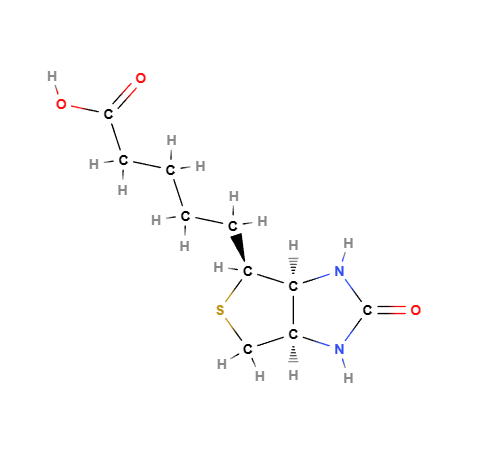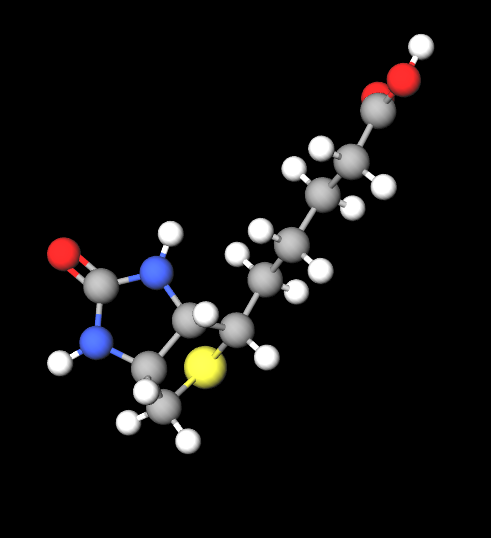Vitamin H, more commonly known as biotin or Vitamin B7, is part of the B vitamin family. It plays a crucial role in the body's metabolism, helping convert food into energy. Biotin is also essential for the health of hair, skin, and nails, which is why it's often highlighted in beauty and health supplements.
Main uses and benefits
Metabolic Function: Biotin is involved in the metabolism of fats, carbohydrates, and proteins, acting as a coenzyme in several metabolic reactions that release energy from nutrients.
Skin Health: It contributes to maintaining the health of the skin, helping to prevent issues such as rashes and acne.
Hair and Nail Health: Biotin is widely recognized for its contribution to the strength and growth of hair and nails, leading to its popularity in supplements for these purposes.
Nervous System Health: Biotin plays a role in supporting the nervous system, contributing to cognitive functions and psychological well-being.
Pregnancy and Breastfeeding: Adequate biotin levels are important during pregnancy and breastfeeding, as it supports embryonic growth and development.
Dietary Sources: Biotin can be found in a variety of foods, including eggs, nuts, seeds, sweet potatoes, and whole grains, making it accessible through a balanced diet.
Supplementation: While deficiency is rare, supplementation may be recommended in certain conditions, such as biotinidase deficiency, or for people with increased needs, such as pregnant or breastfeeding women.
Chemical Industrial Synthesis Process
- Microbial Fermentation. One method of producing Biotin is through the fermentation of selected microbial strains that are capable of naturally synthesizing the vitamin. This process uses nutrient-rich substrates to fuel microbial growth and Biotin production.
- Chemical Synthesis. Alternatively, Biotin can be produced through chemical synthesis processes that combine specific chemical precursors in a series of controlled reactions to form the molecular structure of Biotin.
- Extraction and Purification. After fermentation or synthesis, Biotin is extracted from the reaction medium and purified to remove impurities and by-products. This may include techniques such as chromatography, crystallization, and filtration.
- Quality Control. The purified product undergoes rigorous quality control checks to verify its purity, potency, and compliance with the standards required for food, cosmetic, or pharmaceutical use. These tests can include spectroscopic and chromatographic analyses.
- Formulation. The purified Biotin can be formulated into various forms, such as powders, tablets, capsules, or liquid solutions, for use in dietary supplements, cosmetic products, or pharmaceuticals.
It is used in the medical field for the treatment of alopecia (1) for which they are also used: melatonin, caffeine, marine protein extract, zinc solution (2).
Molecular Formula C10H16N2O3S
Molecular Weight 244.31
CAS 58-85-5
UNII 6SO6U10H04
EC number 200-399-3
References_____________________________________________________________________
(1) Patel DP, Swink SM, Castelo-Soccio L. A Review of the Use of Biotin for Hair Loss. Skin Appendage Disord. 2017 Aug;3(3):166-169. doi: 10.1159/000462981. Epub 2017 Apr 27. PMID: 28879195; PMCID: PMC5582478.
Abstract. Background: Biotin has gained commercial popularity for its claimed benefits on healthy hair and nail growth. Despite its reputation, there is limited research to support the utility of biotin in healthy individuals....Conclusions: Though its use as a hair and nail growth supplement is prevalent, research demonstrating the efficacy of biotin is limited. In cases of acquired and inherited causes of biotin deficiency as well as pathologies, such as brittle nail syndrome or uncombable hair, biotin supplementation may be of benefit. However, we propose these cases are uncommon and that there is lack of sufficient evidence for supplementation in healthy individuals.
(2) Famenini, S., & Goh, C. (2014). Evidence for supplemental treatments in androgenetic alopecia. Journal of Drugs in Dermatology: JDD, 13(7), 809-812.
Abstract. Currently, topical minoxidil and finasteride are the only treatments that have been FDA approved for the treatment of female pattern hair loss and androgenetic alopecia. Given the incomplete efficacy and sife effect profile of these medications, some patients utilize alternative treatments to help improve this condition. In this review, we illustrate the scientific evidence underlying the efficacy of these alternative approaches, including biotin, caffeine, melatonin, a marine extract, and zinc.
Other Studies
Biotin interference in high-sensitivity cardiac troponin T testing: a real-world evaluation in acute cardiac care.Vroemen WHM, van Doorn WPTM, Kimenai DM, Wodzig WKWH, de Boer D, Bekers O, Meex SJR. Cardiovasc Res. 2019 Oct 30. pii: cvz277. doi: 10.1093/cvr/cvz277.
Dietary Biotin Supplementation Impairs Testis Morphology and Sperm Quality. Pastén-Hidalgo K, Riverón-Negrete L, Sicilia-Argumedo G, Canul-Medina G, Salazar-Anzures T, Tapia-Rodríguez M, Hernández-González EO, Roa-Espitia AL, Cedillo-Peláez C, Fernandez-Mejia C. J Med Food. 2019 Oct 29. doi: 10.1089/jmf.2019.0137.
Clinically Significant Lab Errors due to Vitamin B7 (Biotin) Supplementation: A Case Report Following a Recent FDA Warning. Rosner I, Rogers E, Maddrey A, Goldberg DM. Cureus. 2019 Aug 23;11(8):e5470. doi: 10.7759/cureus.5470.
Biotin: overview of the treatment of diseases of cutaneous appendages and of hyperseborrhea. Piraccini BM, Berardesca E, Fabbrocini G, Micali G, Tosti A. G Ital Dermatol Venereol. 2019 Oct;154(5):557-566. doi: 10.23736/S0392-0488.19.06434-4.
Novel multifunctional triple folic acid, biotin and CD44 targeting pH-sensitive nano-actiniaes for breast cancer combinational therapy. Liu M, Wang B, Guo C, Hou X, Cheng Z, Chen D. Drug Deliv. 2019 Dec;26(1):1002-1016. doi: 10.1080/10717544.2019.1669734.
Anti-pollution cosmetic-based one-step formation of w/o/w multiple emulsion containing D-biotin for skin protection: fabrication and in vitro and in vivo evaluation. Ali A, Iqbal S, Ilyas A, Khan H, Asad MHHB, Fatima N, Akhtar N. Drug Deliv Transl Res. 2019 Jun 25. doi: 10.1007/s13346-019-00655-w.
Biotin attenuation of oxidative stress, mitochondrial dysfunction, lipid metabolism alteration and 7β-hydroxycholesterol-induced cell death in 158N murine oligodendrocytes. Sghaier R, Zarrouk A, Nury T, Badreddine I, O'Brien N, Mackrill JJ, Vejux A, Samadi M, Nasser B, Caccia C, Leoni V, Moreau T, Cherkaoui-Malki M, Salhedine Masmoudi A, Lizard G. Free Radic Res. 2019 May;53(5):535-561. doi: 10.1080/10715762.2019.1612891.
![]() Vitamin H
Vitamin H 



